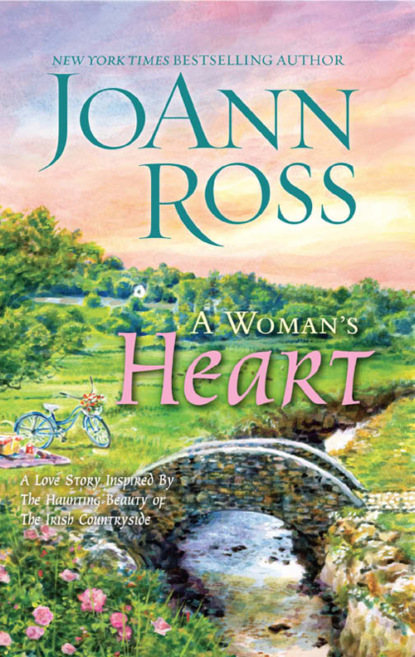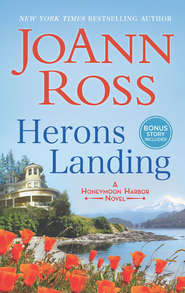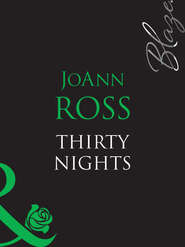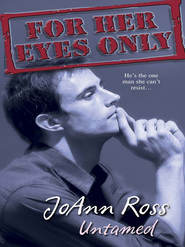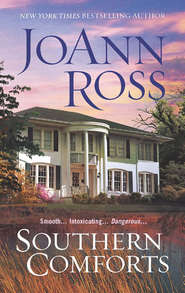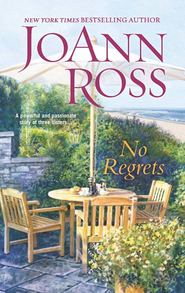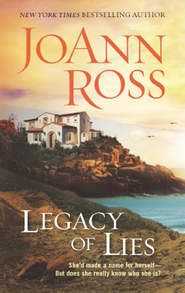По всем вопросам обращайтесь на: info@litportal.ru
(©) 2003-2025.
✖
A Woman's Heart
Автор
Год написания книги
2019
Настройки чтения
Размер шрифта
Высота строк
Поля
One thing he hadn’t been able to discount was that momentary flash of shared sexual awareness, when he’d caught a glimpse of something in her eyes, something he couldn’t quite put a finger on. It couldn’t be inexperience, since she had, after all, been married. She’d even had a child, he recalled Brady telling him. A son.
Innocence, perhaps?
Whatever it was, even tanked as he’d been, every instinct Quinn possessed had told him that Nora Fitzpatrick was trouble. With a capital T.
“No point in borrowing trouble,” he muttered, quoting his mother, who’d always possessed a natural knack for doing exactly that. “The widow Fitzpatrick is off-limits.”
He’d no sooner stated the vow when he heard a whimper he first thought might have come from him. Gingerly opening one eye, he came face-to-face with a huge furry gray, white and black muzzle and a pair of limpid brown eyes.
“Either Brady has taken to parking a Buick in the bedroom, or you’re the biggest damn dog in Ireland.”
The beast whimpered again, a thin sound more suited to some toy breed a tenth its size, then self-consciously looked away.
“You can’t be shy.”
One ear cocked. But the dog still refused to meet Quinn’s gaze.
He reached out, caught hold of the muzzle and turned the fuzzy face back toward him. “Hell, don’t tell me I hurt your feelings.”
He’d never had a dog. The closest he’d ever come to having a pet was the field mouse he’d captured when he was seven and his family had been living in a trailer outside Apache Junction, Arizona. Using money earned running errands for a local bookie, he’d bought a hamster cage from Kmart, which he hid in a kitchen cupboard. Since his mother had never been one to cook, it had seemed the safest place.
He’d kept the mouse for nearly a week, feeding it limp lettuce from a nearby Safeway Dumpster. Unfortunately his father had discovered it while searching for a carton of cigarettes, cussed him out royally, then whipped him with a belt that had left welts for two weeks. Years later he still had the scars from the buckle to remind him of that day.
The mouse had fared even worse. His father had suffocated it in a plastic bag, then tossed it outside for the feral desert cats to tear apart.
“You realize, of course,” Quinn said to the dog now, “you’re too big to be such a candy-ass.”
The dog rolled brown eyes beneath furry beetled brows.
“I’m not going to hurt you, dammit.”
Another whimper. And if a dog could look dubious, this one was definitely pulling it off. Quinn shook his head in disgust, then wished he hadn’t when boulders started tumbling around inside.
“Lord, we’re a pitiful pair,” he muttered, crawling out of the double bed.
Although his legs felt as if he were walking on the deck of a rolling ship, Quinn managed to make his way into the adjoining bathroom, which smelled vaguely of flowers, followed by the wolfhound who trailed a safe three feet behind. One look at the haggard face in the mirror assured him he looked every bit as bad as he felt.
He opened the medicine cabinet, found a bottle of aspirin, poured three of them into his palm and swallowed them dry. He found a new toothbrush and a bar of soap still in its wrapper, realized that Nora Fitzpatrick must have left them for him, and decided the woman, while still Trouble, was a saint.
He brushed his fuzzy teeth, splashed cold water onto his face, then took a long hot shower that filled the small room with steam and smoothed out some of the kinks in his hungover and jet-lagged body. The towel he wrapped around his hips was a far cry from the thick Egyptian-cotton ones he was accustomed to, but it was pleasantly soft and smelled like sunshine.
By the time he’d shaved with the razor he found in the cabinet, he was beginning to feel as if he just might live.
“So what do you think?” he asked the dog, who was sitting on its haunches watching his every move. “Feel up to some breakfast?”
When the oversize tail began thumping on the floor and the huge pink tongue lolled, Quinn decided he’d just found the dog’s weakness.
“Guess that’s the magic word.” Ignoring the lightning bolts behind his eyes, he bent and rubbed the massive multihued streaked head. “The room’s supposed to come with two meals a day. Let’s go see what’s on the menu.”
Fearing he’d have to wear yesterday’s clothes, which could definitely use an airing, Quinn was gratified to see his luggage lined up just inside the bedroom door. Apparently the friendly police officer who’d arrived to take Brady and him to the farm had rescued the suitcases from his rental car. As he pulled on a pair of clean briefs, Quinn decided a donation to the local police benevolent fund was definitely in order.
He made his way down the stairs; the dog, appearing a bit more emboldened, stayed close on his heels, nails clicking on the wood.
The kitchen could have appeared on the cover of some country-living magazine: a bright blue-plaid oilcloth covered the round table, and the unmatched wooden chairs surrounding the table had been painted school-bus yellow. The window had been left open to admit moist air that carried the fragrance of freshly mowed grass and the distant scent of the sea; white lace curtains swayed in the early-morning breeze.
He found an old-fashioned aluminum percolator sitting on the stove. The note taped to it informed him that the family was at mass and would be home by ten o’clock at the latest.
“I’ll be making breakfast,” the neat convent-schoolgirl script assured him. “But if you wake before I return, there’s porridge on the stove, a tin of coffee on the counter, and you’re welcome to anything you find in the icebox.” It was formally signed, Nora Fitzpatrick.
Quinn glanced up at the round-faced wooden clock on the wall. If he had to wait another forty-five minutes for coffee, he just might die, after all.
“Looks as if we’re on our own, sport.” The oatmeal, kept warm in a double boiler and too reminiscent of youthful farm days, held little appeal.
When he opened the refrigerator door, the dog grinned. “How about some bacon?” Quinn took the white-wrapped bundle from the meat compartment and a blue bowl of speckled eggs from a wire shelf. “Do you prefer your eggs scrambled or fried?”
The dog barked eagerly.
“Yeah, me, too,” Quinn said. “Fried it is.”
The bacon was thick and spicy, more like ham than the bacon Quinn was used to back home. Both he and the dog agreed it was delicious. The oversize eggs might have ended up a little crispy at the edges, but neither of them was in a mood to complain. Quinn ate three, enjoying the sweet taste of the butter he’d fried them in; the dog inhaled two.
The only failure was the coffee. It was as thick as the black peat bogs Quinn had passed on the way to Castlelough.
“Peat would probably taste a damn sight better,” he told the dog, whose morose expression seemed to be offering canine sympathy.
Although he usually drank his coffee black, he tried cutting it with the rich cream he found in the refrigerator, then tossed in a heaping spoonful of sugar. He took another tentative sip, decided it wasn’t going to get any better, but in desperate need of caffeine, downed it in long swallows, anyway, like bitter-tasting medicine.
The caffeine clicked in almost instantly, putting a slightly sharper edge on the fog surrounding his brain. Quinn decided some fresh air might do the rest.
“So how about giving me a tour?” he suggested to the dog after he’d washed and dried the dishes and put them away.
Filming didn’t begin for another two days, and since he’d left the rented Mercedes outside the pub, Quinn figured he was stuck here until the family returned and someone could drive him into Castlelough to retrieve it. Then again, he reconsidered, from what he remembered of last night’s drive, it wasn’t that far into town. He could probably walk there. Later, after he felt more human.
When he opened the door that was split in two Dutch-style, the dog raced out ahead of him.
The house he’d only glanced at last night was a basic two-story farmhouse with a rounded yellow thatched roof. It was in need of a fresh whitewash, but the baskets of crimson flowers hanging on either side of the blue door added cheerful splashes of color. Several red hens pecked in the gravel in front of the house, green herbs jostled for space in a small garden, the white sheets on the clothesline fluttered in the morning breeze, and a rutted dirt driveway led to a wooden gate.
Last night’s rain had stopped, leaving the sky clear save for the wisps of blue smoke coming from the chimney and a few clouds that meandered overhead looking like shaggy lambs. The land folded out in green fields where herds of white-faced cows and flocks of sheep grazed. The heads and shoulders of the sheep had been marked for identification with various Day-Glo colors, and the blue, orange, chartreuse and scarlet gave the shaggy animals the look of punk rockers.
Since the nearby barn brought back more memories of those harsh foster-care days he was determined to forget, Quinn went back into the house to unpack.
* * *
Nora stood outside the gray stone church, surprised to discover that by allowing one of the Americans into her house she’d become a celebrity of sorts herself. Everyone, it seemed, wanted to know what the famous Mr. Quinn Gallagher was like.
“We didn’t have much opportunity to talk,” she replied evasively to Father O’Malley’s inquiry regarding her boarder. The priest was a young man with a tall, asparagus-stalk-thin body. The first time Nora had watched the father cutting peat, she’d realized the cleric was far more vigorous than his bookish ascetic appearance suggested. “He arrived late.”
“I heard he spent the evening at The Rose. Do you think he has a drinking problem?” the priest asked with a frown.





